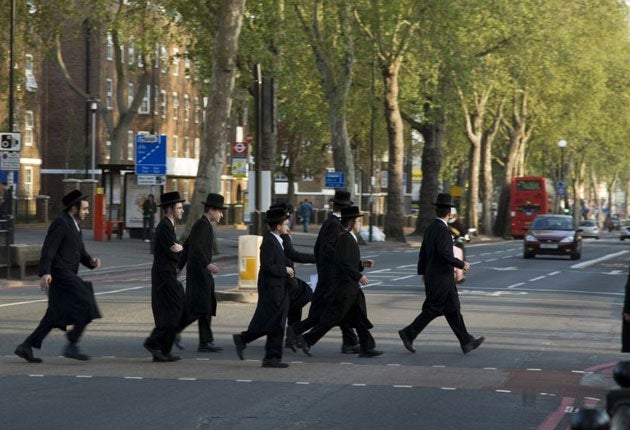An unorthodox way to talk it over
How do you persuade an ultra-insular community to speak out? Jessica Elgot, this year's winner of the Wyn Harness prize, reports

In the world beyond the kosher bakeries and Yiddish supermarkets of Stamford Hill in Hackney, London, a blue hat isn't a great cause for concern. But in this strictly Orthodox Jewish community where friends wear black or brown hats, agonising over a blue one can be enough to drive someone to seek help.
That's the tip of the iceberg, says José Martin – founder of Talking Matters, a unique counselling centre for the Stamford Hill community. Other widespread concerns include reductions in housing benefit and funding a private, religious education for between six and 10 children.
Ms Martin says: "One lady was really troubled by whether she could wear a blue hat. That to most people would be a non-issue but in this community it can be huge."
And it can have major consequences, Ms Martin explains. "There are arranged marriages, shidduchim. If little Moishe starts acting differently, people start saying, 'Don't marry into his family.' The pressures to conform here are double anywhere else."
Talking Matters, based on the top floor of Stamford Hill's library, was set up in 2001 to help people to face their fears of doing anything outside the norm. Although no real figures exist, the impoverished, secretive community is thought to be 20,000-strong with 50 synagogues in two square miles.
Many of the clients, especially children, are still unable to vocalise their issues. Therapies now include art, acupuncture, reflexology, reiki, shiatsu and music.
The centre aims to deal with anxiety before clients have breakdowns. Ms Martin says problems go back decades. "We have Holocaust survivors who didn't talk and, now three generations down the line, people have learnt certain behaviour."
Ms Martin, previously Hackney Council's Orthodox liaison officer, realised no help existed for this community. "Everyone was too scared to set something like this up because people would say, 'What's wrong with them or their family?' I don't have those issues."
Now the organisation helps 1,500 people a year, including children.
"Ninety-nine per cent of our counsellors are Orthodox Jews, but our dance therapist is Eastern European, our shiatsu therapist is Lebanese Muslim. I think we are the only Orthodox Jewish group around which is that integrated."
Tova Charazi, the group's previous female outreach worker, said the group commands a unique trust. "Here we understand the faith issues but because we are not really ultra-Orthodox, they trust us. They can talk to us and not everyone else will find out."
Humanistic counsellor Ronen Naor says most of the problems he encounters have never been voiced before. "There's a lot of conditioning in this community. And then they grow up and start to have doubts."
Phobias can be a major issue. "The kids are frightened of dogs, bees, wasps, anything that's not kosher. So we give them plastic lions and tigers. I say to parents, 'It's plastic, you don't have to eat it.' Challenging is very important. It might have four legs and fur but HaShem created it. We challenge social norms but not beliefs."
Ms Martin was originally advised she would be lucky to get a 10 per cent quota of male clients. But now, 67 per cent are men. "The reason is, girls bake challahs together and then they talk," Ms Martin says.
"For men, if you're not learning Talmud well enough, or if you've got bills to pay, there's no one to confide in. Your wife, the rabbi, they all have expectations."
But the organisation has funding concerns of its own. Funded by the local Primary Care Trust, operations in north-west London must shut down, after a grant was pulled. Ms Martin says: "We spent three years building it up and we were just starting to get GP referrals.
"Fundraising is a non-starter. People here don't donate money for counselling. We've tried it twice and got nowhere fast.
"The Government want groups like ours to start charging for their services, but for six years, we've been charging £5 per person per hour. It's going up to £7.50 next April and even then it doesn't cover the loss we will make.
"But I have emunah, I have faith. We keep having great successes. If you work hard, God will make sure it happens."
About The Wyn Harness Prize
The Wyn Harness Prize for Young Journalists was established in November 2008 in memory of The Independent's former assistant editor Wyngate Harness, who died from an inoperable brain tumour in 2007.
Jessica Elgot, 24, was awarded the 2011 Wyn Harness prize for this piece. The judges said her piece "treated a serious subject in an entertaining way, without losing sight of the underlying issues".
Jessica is a reporter for The Jewish Chronicle, and a graduate of the Cardiff School of Journalism and the University of Nottingham. She says: "I've always been fascinated by the strictly Orthodox Jewish community in Stamford Hill, a community which even mainstream Jews have little insight into. I first encountered Talking Matters writing a piece on an award they won from Hackney Council, and was struck by this tiny little charity who are dealing with these issues of repression in many families, which can date back to the Holocaust. It's tragic that it's these smaller, specialist charities whose tiny budgets are being slashed to ribbons by local authority cuts, who now have no option than to charge their struggling clients more money."
Join our commenting forum
Join thought-provoking conversations, follow other Independent readers and see their replies
Comments
Bookmark popover
Removed from bookmarks